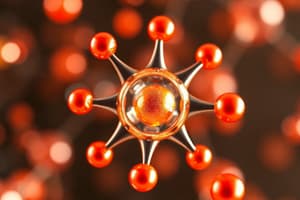Podcast
Questions and Answers
What is the relative mass of a proton compared to an electron?
What is the relative mass of a proton compared to an electron?
- 0
- 1/1840
- 1840
- 1 (correct)
Which of the following statements about isotopes is TRUE?
Which of the following statements about isotopes is TRUE?
- Isotopes have different numbers of protons.
- Isotopes are defined by their varying charges.
- Isotopes have identical physical properties.
- Isotopes have the same number of protons but different numbers of neutrons. (correct)
What information does the atomic number provide about an atom?
What information does the atomic number provide about an atom?
- The number of electrons in the atom.
- The total number of neutrons in the atom.
- The number of protons in the nucleus. (correct)
- The mass of the atom.
What is the primary function of a time of flight mass spectrometer?
What is the primary function of a time of flight mass spectrometer?
How are neutrons calculated within an atom?
How are neutrons calculated within an atom?
What represents the second ionisation energy?
What represents the second ionisation energy?
Which factor affects ionisation energy by increasing the attraction between the nucleus and electrons?
Which factor affects ionisation energy by increasing the attraction between the nucleus and electrons?
Why are successive ionisation energies always larger?
Why are successive ionisation energies always larger?
What happens during the ionisation process described in the equation Ti+ (g) → Ti2+(g) + e-?
What happens during the ionisation process described in the equation Ti+ (g) → Ti2+(g) + e-?
What does shielding refer to in the context of ionisation energy?
What does shielding refer to in the context of ionisation energy?
Which statement about ionisation energies is true?
Which statement about ionisation energies is true?
What significant jump in ionisation energy is typically observed?
What significant jump in ionisation energy is typically observed?
Which of the following best explains the trend in ionisation energies across a period?
Which of the following best explains the trend in ionisation energies across a period?
What occurs to first ionisation energy as you move down a group in the periodic table?
What occurs to first ionisation energy as you move down a group in the periodic table?
Why does sodium have a much lower first ionisation energy compared to neon?
Why does sodium have a much lower first ionisation energy compared to neon?
What is the primary reason for the increase in first ionisation energy across a period?
What is the primary reason for the increase in first ionisation energy across a period?
What happens to the first ionisation energy when moving from magnesium to aluminum?
What happens to the first ionisation energy when moving from magnesium to aluminum?
Why is there a small drop in first ionisation energy from phosphorus to sulfur?
Why is there a small drop in first ionisation energy from phosphorus to sulfur?
How does the concept of shielding affect the first ionisation energy down a group?
How does the concept of shielding affect the first ionisation energy down a group?
Which element would likely have the highest first ionisation energy?
Which element would likely have the highest first ionisation energy?
What is the effect of increasing nuclear charge without a corresponding increase in shielding across a period?
What is the effect of increasing nuclear charge without a corresponding increase in shielding across a period?
What happens to MH+ ions as the solvent evaporates?
What happens to MH+ ions as the solvent evaporates?
In an electric field, how does the mass of a particle affect its velocity?
In an electric field, how does the mass of a particle affect its velocity?
What distinguishes ions in the flight tube?
What distinguishes ions in the flight tube?
What does the current generated in the detector indicate?
What does the current generated in the detector indicate?
What is the mass-to-charge ratio (m/z) of 24Mg2+?
What is the mass-to-charge ratio (m/z) of 24Mg2+?
Which equation represents the relationship between kinetic energy, mass, and velocity?
Which equation represents the relationship between kinetic energy, mass, and velocity?
Given ions have the same kinetic energy, which will move faster?
Given ions have the same kinetic energy, which will move faster?
How long would an ion of 59Ni+ take to travel along a flight tube that is 0.8000 m long if accelerated to 1.000 x 10-16 J of kinetic energy?
How long would an ion of 59Ni+ take to travel along a flight tube that is 0.8000 m long if accelerated to 1.000 x 10-16 J of kinetic energy?
What is the percentage abundance of the isotope 63-Cu?
What is the percentage abundance of the isotope 63-Cu?
Which of the following isotopes of chlorine has a higher percentage abundance?
Which of the following isotopes of chlorine has a higher percentage abundance?
What is the relative abundance contribution for the 160 m/z peak in the bromine mass spectrum?
What is the relative abundance contribution for the 160 m/z peak in the bromine mass spectrum?
When using a mass spectrometer, what typically happens to the molecules during the ionization stage?
When using a mass spectrometer, what typically happens to the molecules during the ionization stage?
How does the abundance of Br79 compare to that of Br81?
How does the abundance of Br79 compare to that of Br81?
What percentage abundance does the isotope 65-Cu have?
What percentage abundance does the isotope 65-Cu have?
What is the significance of including mass spectrometers in planetary space probes?
What is the significance of including mass spectrometers in planetary space probes?
What equation is used to calculate the weighted average of the isotopes in copper?
What equation is used to calculate the weighted average of the isotopes in copper?
Flashcards are hidden until you start studying
Study Notes
Atomic Structure
- Three fundamental sub-atomic particles:
- Proton: located in the nucleus, relative mass of 1, charge of +1
- Neutron: located in the nucleus, relative mass of 1, charge of 0
- Electron: located in orbitals, relative mass of 1/1840, charge of -1
- Lithium (Li) represents an atom with a mass number of 7 and an atomic number of 3.
- Atomic number (Z) indicates the number of protons; mass number (A) equals the total count of protons and neutrons (A = Z + N).
Isotopes
- Isotopes are variants of elements with the same proton count but different neutron counts.
- Isotopes exhibit similar chemical properties due to identical electronic structures but can have varying physical properties due to different masses.
- Mass spectrometers determine isotopes in a sample regardless of ionization tendencies.
Ionization Energy
- Second ionization energy: enthalpy change for forming one mole of gaseous ions with a single positive charge into one mole of gaseous ions with a double positive charge, exemplified by the reaction Ti+(g) → Ti2+(g) + e-.
- Factors influencing ionization energy:
- Nuclear attraction: More protons enhance attraction.
- Electron distance: Outer electrons further from the nucleus experience weaker attraction.
- Shielding effect: Electrons in inner shells reduce nuclear attraction felt by outer electrons.
Successive Ionization Energies
- Patterns in successive ionization energies reveal electronic structure insights.
- Each successive ionization energy is larger due to increased effective nuclear attraction after each electron is removed.
- Significant jumps in ionization energy, such as between the fourth and fifth electrons, suggest that subsequent electrons reside in closer inner shells, raising attraction to the nucleus.
Trends in Ionization Energies
- Ionization energies decrease down a group due to increased shielding and distance from the nucleus.
- Ionization energies increase across a period as protons increase, enhancing nuclear attraction while maintaining the same shielding effect.
- Sodium (Na) has lower ionization energy than neon (Ne) due to lower nuclear attraction on its outer electron being further from the nucleus and more shielded.
Mass Spectrometry
- Acceleration stage: positive ions accelerated by an electric field to a constant kinetic energy; lighter ions travel faster than heavier ions.
- Flight tube: ions distinguished by flight time, with lighter ions moving faster than heavier ones.
- Detection: ions generate current upon reaching the detector; current size correlates with species abundance.
Example Calculations
- For nickel isotope analysis:
- Example isotope: 59Ni; kinetic energy of ions is 1.000 x 10^-16 J, flight tube length is 0.8000 m.
- Example calculations yield abundance percentages for isotopes of copper (Cu): 72.5% for ^63Cu and 27.5% for ^65Cu.
Mass Spectra
- Chlorine isotopes: Cl35 (75%) and Cl37 (25%).
- Bromine isotopes: Br79 (50%) and Br81 (50%).
- Mass spectra diagrams illustrate relative abundances and molecular fragments from electron impact ionization, leading to distinct peaks in the spectrum.
Applications of Mass Spectrometry
- Mass spectrometers deployed in space probes identify elemental compositions on other planets that may differ in isotopic abundances from Earth.
Studying That Suits You
Use AI to generate personalized quizzes and flashcards to suit your learning preferences.




